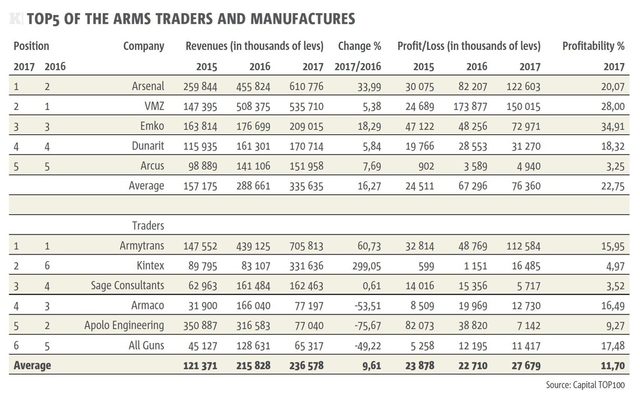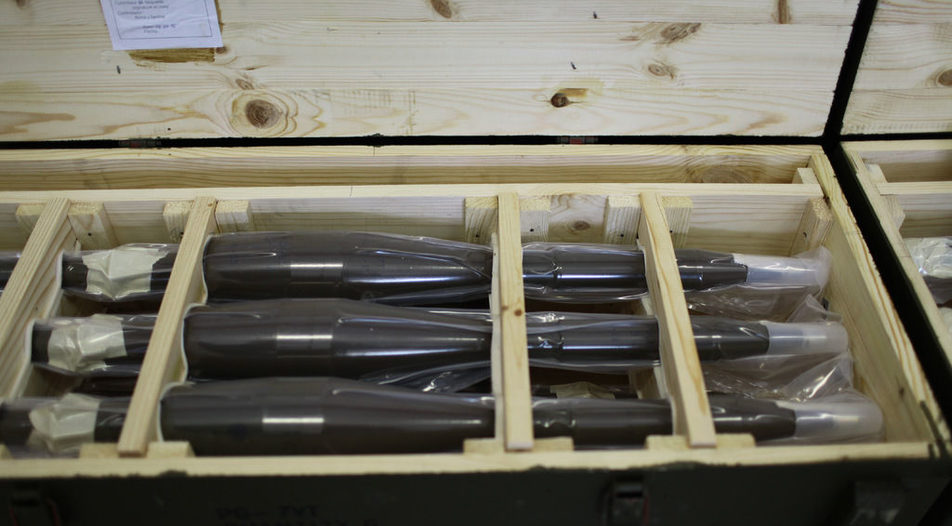The impressive growth of arms manufacturers and traders, which had nearly doubled their turnovers every year recently, made the 16-percent increase in 2017 look like running in place. However, the average net margin of 23% achieved by Bulgarian producers was surely the envy of many industries. The reports of the largest companies in the sector in late 2017 showed the pace was slowing down and the first quarter of 2018 was clearly disturbing for an export-oriented sector that employs nearly 20,000 people.
Some observers say that the window of opportunity provided by re-armament programs in the Middle East has closed. Nevertheless, the mood at the latest Hemus defense industry exhibition, which was held in Plovdiv in May, was optimistic.
Managers in the sector say that the drop seen in the past few months was due to completion of old contracts with traditional partners. As for the future, forecasts diverge. Pessimists see the end of strong orders as the states in conflict zones have replenished their stock and also because of the not-so-perfect quality delivered by some Bulgarian manufacturers. Optimists expect new contracts at the end of the year and are piling up stock.
Growing manufacturers
The revenue of the largest arms manufacturers in Bulgaria increased 16% last year. With impressive growth of 34% to 610 million levs state-owned Arsenal took the first place in the sector. Another large producer, state-owned VMZ, had a more modest performance but it also contributed more than half a million levs to the industry's total sales last year. In the first quarter of 2018 however VMZ's turnover decreased by 67%. The revenues of privately-owned Arkus rose 5.8% and those of Dunarit grew 7.7% despite the problems caused to the company by an attempt to nationalize it. The government's exercise of temporarily stripping Emko of its license does not show in the company's report.
All manufacturers posted profit and none of them showed signs of having issues with working capital, which had been quite a problem during the crisis and especially after the failure of Corporate Commercial Bank, which used to be their main financing institution. The reason is that most commercial banks do not extend financing for arms production, although that has been changing and now more Bulgarian-owned lenders, especially state-owned Bulgarian Development Bank, are ready to provide such financing.

The big differences in the manufacturers' performance can be explained with the fact that deliveries are pre-ordered as a rule and they were completed last year. Although manufacturers try to sell their products by themselves, they all rely mainly on established traders for their exports. VMZ is an example of such dependence on traders: its 2017 report reads that more than 85% of the output is exported through a local contractor. However, the contractor in question, Kintex, is also owned by the state and is encouraged to promote the products of the state-owned manufacturer at the expense of privately-owned producers.
The problem is that in such a short time span the arms plants could not switch to civilian production, which would be their only rescue before resorting to staff cuts. Their reports show that during the standstill their civilian products had a one-digit percentage share of their output.
Reshuffle among traders
Arms traders faced similar problems and experienced dynamic changes in 2017. State-owned Kintex was the best performing company as its sales quadrupled to 331.6 million levs and its profit expanded fourteen-fold to 16.4 million levs. At the same time privately-owned Sage Consultants reported a drop in profit of 63% to 5.7 million levs.
For the past two years, privately-owned Armytrans has topped the list of arms traders. The company, owned by Dimitar Piralkov and Dimcho Bobchev, exports products mainly to Saudi Arabia and Niger, according to its 2016 report. At the same time former giant Apolo Engineering, whose main market is Iraq, has seen its turnover drop.
Experts say the data should not be interpreted statically, as contracts are closed for a certain volume of products which often are not manufactured and delivered in the same calendar year. For instance, in December 2016 Kintex made a big shipment worth 22.2 million levs but it was entered into the books in 2017.
Traders expect to close new long-term contracts in late 2018 with traditional partners such as India, the United States and Asia. Bulgaria exports mainly ammunition and components and the products that are not manufactured locally are delivered from countries like Ukraine. Judging by the exports of Kintex, which is the largest and most representative market player, products made in Bulgaria make up approximately 74% of total exports and 90% of the shipments contain ammunition.
The impressive growth of arms manufacturers and traders, which had nearly doubled their turnovers every year recently, made the 16-percent increase in 2017 look like running in place. However, the average net margin of 23% achieved by Bulgarian producers was surely the envy of many industries. The reports of the largest companies in the sector in late 2017 showed the pace was slowing down and the first quarter of 2018 was clearly disturbing for an export-oriented sector that employs nearly 20,000 people.
Some observers say that the window of opportunity provided by re-armament programs in the Middle East has closed. Nevertheless, the mood at the latest Hemus defense industry exhibition, which was held in Plovdiv in May, was optimistic.












